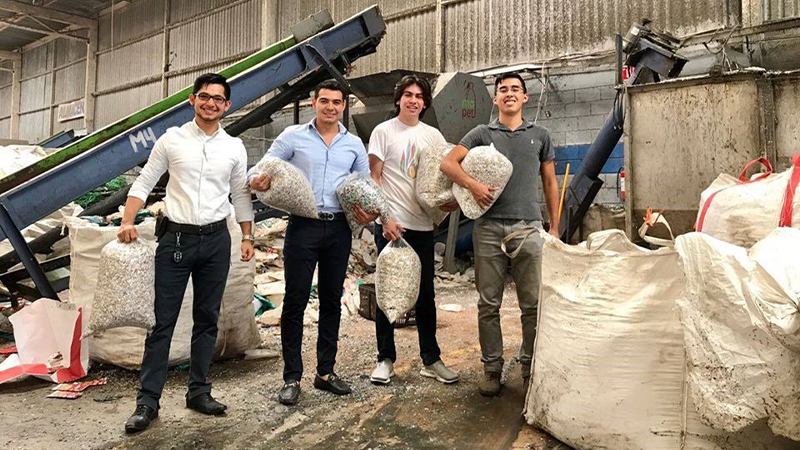MEXICO
In partnership with global nonprofit Enactus, Ford Fund invites student teams to develop ideas for innovative projects that address an unmet social need or problem in the local community—ranging from safety to workforce development to access to mobility, and more. Each year, up to four Enactus student are selected to receive a $5,000 USD grant to implement their project. Through this program, students use entrepreneurial action to make people’s lives better and help their community become a more sustainable place to work and live.
2020 Ford College Community Challenge Winning Projects

Autonomous University of Nuevo Leon (UANL): San Nicolás de los Garza
Project RETRAK takes Tetra Pack, a type of packaging for milk or juice, and puts it through a recycling process that produces poly aluminum, a strong, waterproof, fireproof, tension resistant and low-cost material. Enactus UANL (Autonomous University of Nuevo Leon) uses the recycled material to build an educational space that focuses on STEAM (science, technology, engineering, arts and math) education. Through RETRAK, the team is transforming the way social and educational spaces can be built using recycled materials. The STEAM classroom is equipped with 30 Softtek computers and several LEGO kits. Thanks to the Ford College Community Challenge grant, Enactus UNAL will be able to expand their project by creating more innovative STEAM classrooms, and eventually homes and community spaces as well.

Mexican Valley University: Zapopan
Enactus Mexican Valley University, Campus Zapopan is creating a diaper made from 100% biodegradable materials through project Baguis. The diaper has an absorbent layer of agave bagasse and its outer cover is 100% cotton. The agave bagasse used in the diaper is an upcycled waste byproduct of the Mexican tequila industry. Another added benefit of the biodegradable diaper is that it can be used as fertilizer instead of being thrown away once used. The concept for the product was started after the team discovered that in Mexico, disposable diapers are the third most polluting product, contain polymers that can take up to 500 years to decompose and take up nearly 50% of space in landfills.

Technological Institute of Morelia: Morelia
The Quiroga community is nationally recognized for its production of carnitas and its large tourism sector. However, the activity generates thousands of liters of residual fat every month as waste. In many instances, the fat is not adequately treated and is usually poured into the community drainage where it eventually reaches nearby rivers and lakes, contaminating them and affecting aquatic life. The biodiesel project from Enactus Technological Institute of Morelia was created in conjunction with the Quiroga City Council to satisfy the urgent need to avoid such problems. It consists of using the residual fat as a raw material for the production of biodiesel through a process called transesterification. In this process, the triglycerides present in fat react with an alcohol in the presence of a basic catalyst to form biodiesel and glycerin as a secondary value-added product. The project not only seeks to satisfy the need to manage the fat by producing biodiesel, but it also seeks to change transportation by trading the use of highly polluting fossil fuels for renewable fuels and promoting more environmentally responsible mobility.

Monterrey Institute of Technology and Higher Studies: Monterrey
REOX Energy is a renewable energy company that uses the electric charge of lightning strikes to drive a perpetual mechanism based on the combustion of hydrogen and the electrolysis of a water molecule. Lightning bolts will be channeled from the troposphere to the Earth's surface (18,000m high) using a series of lasers that follow a path to a water tank. Enactus ITESM (Monterrey Institute of Technology and Higher Studies) Monterrey will connect these laser paths at such heights through drones that emit the lasers. The series of drones will be programmed to form a route so that lightning detects the ultrashort pulsations. Once at the surface level, lightning will pass through a water tank where the electrolysis will take place. The resulting hydrogen will be used as a reliable fuel for manufacturing companies or combusted and transformed into electrical energy for the municipal network. The advantage of hydrogen over other fuels is that it has a calorific potential up to three times higher than gasoline. Unlike the competition in the alternative energy market, Enactus ITESM Monterrey will have the ability to store energy through the accumulation of hydrogen using an ecological system.

Milenium Technological University: Reynosa
Through the Vidasis project, Enactus Tec Milenio Reynosa strives to offer prostheses that fit people's needs and are pollution-free. The prostheses are made from PLA, emulate hand movements and are good for the environment. In addition to creating a pollution-free prosthesis, Enactus Tec Milenio Reynosa wants to change any negative attitudes people may have toward those who have lost a limb and is planning a publicity campaign.


